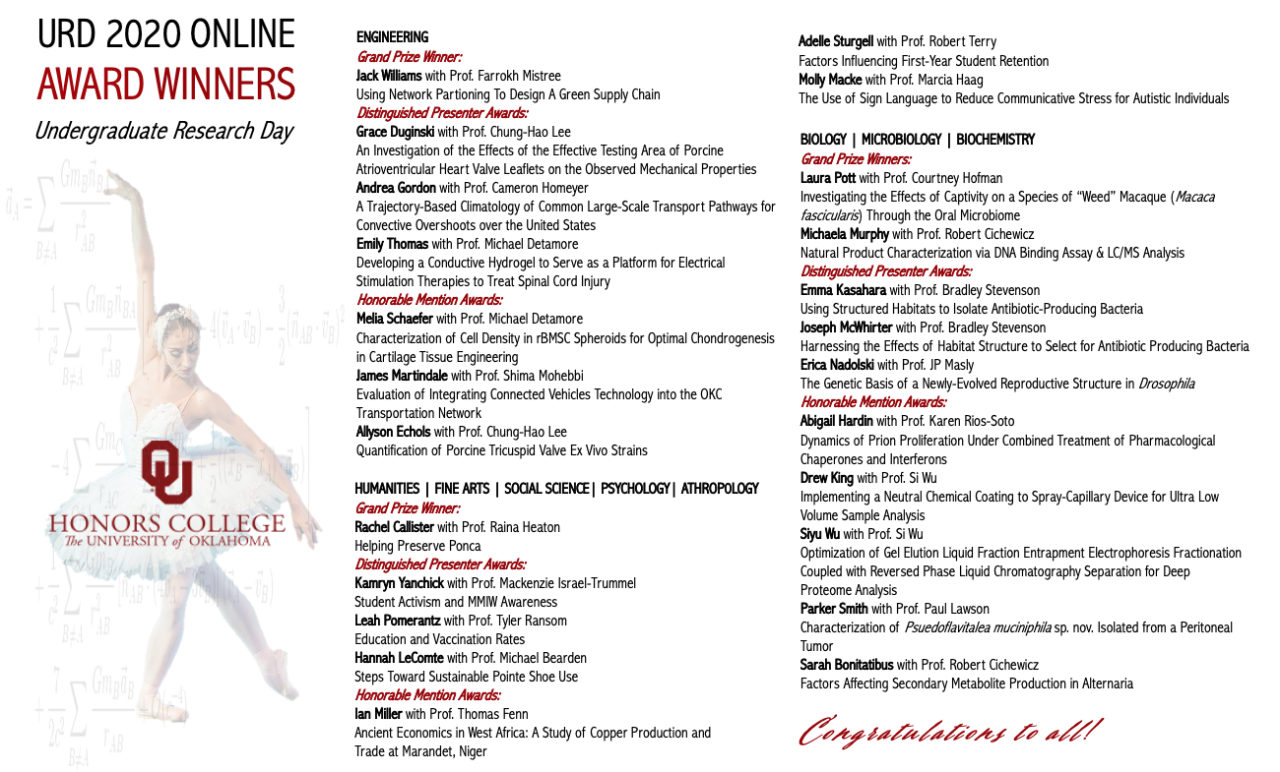
Photo courtesy of OU Honors College
The Center for Open Science was pleased to support Oklahoma University (OU) in recent efforts to migrate its Undergraduate Research Day event to an online format. Read how OU utilized OSF to host abstracts, presentations, and research materials from undergraduates while providing a discovery interface for students, faculty, and attendees.
The OU Honors College’s annual Undergraduate Research Day (URD) is designed to showcase undergraduate research from across the University of Oklahoma campus. This year’s event was threatened by the ongoing COVID-19 pandemic. Originally scheduled for April 4th, the URD invites students to give short talks on their research, either competitively, or non-competitively. Due to campus closure, the event was rescheduled, then ultimately canceled. Interim Dean Doug Gaffin of the Honors College notes, “We were really upset that we had to cancel the in-person event and even more so because of the tremendous growth and interest we have seen in Undergraduate Research Day over the last few years.”
Knowing the importance of the URD, Dean Gaffin made the decision to move the event online. The challenge of reformatting the event motivated Gaffin to seek out ideas from trusted experts across campus.
Tara Carlisle, Head of Digital Scholarship, and Claire Curry, Science Librarian, joined Gaffin and other experts from OU, including John Stewart at the Office of Digital Learning, on the project. Thirty days after beginning discussions, a website was launched to host the event.
Curry, Stewart, and Carlisle consulted internal library experts like Jen Waller, Director of Open Initiatives & Scholarly Communication, university departments such as OU IT, and external partners including Open Science Framework (OSF), to design and shape the student, faculty, and audience experience. They also worked closely with student workers supervised by Magen Bednar and Patrick Wright of University Libraries, and Angela Person of Christopher C. Gibbs College of Architecture, to provide access while remaining attuned to faculty concerns about the permanent nature of a web repository.
Some aspects of the URD remained the same. Students were asked to submit slides, abstracts, and presentations, but the time limit was reduced from fifteen to ten minutes. Due to the online and more permanent nature of recordings, some professors opted to have their students withdraw, or only archive portions due to concerns over potential double publishing. The main difference was asking the students to record their presentations. URD was “held” asynchronously, with announcements made on the Honors College website and twitter, as well as emails when all presentations were online.
Michaela Murphy, who tied for the grand prize in biology, microbiology, and biochemistry, said of the experience, “After putting all the work into my project […], I was excited that I would still be able to present my work. I think this format even made watching other people’s presentations more accessible since during the actual event, we would often be presenting simultaneously. I am very proud of how my presentation turned out and am glad that I and others can access it at any time in the future.”
“The transition would not have been possible without the tremendous help and expertise of many people. It took incredible coordination, and I am so thankful that we have such talented, selfless people on campus,” Dean Gaffin said.
“We were thrilled to work with the OU Honors College to support the URD, as well as their student and faculty research management and sharing across the OSF. Our institutional partners around the world continue to innovate with new ways to catalyze open science, and they inspire us to keep providing exciting infrastructure features to support them,” said COS Product Owner Eric Olson.
View the full list of OU URD 2020 award winners and presentations.
The open source OSF infrastructure streamlines project management, collaboration, and open sharing of research materials, data, and code for researchers throughout the entire research lifecycle. Learn how OSF and OSF Institutions integrate with existing research tools to support researcher workflows, increase efficiency, safeguard data management, and enable greater transparency and integrity in science.

6218 Georgia Avenue NW, Suite #1, Unit 3189
Washington, DC 20011
Email: contact@cos.io

Unless otherwise noted, this site is licensed under a Creative Commons Attribution 4.0 International (CC BY 4.0) License.
Responsible stewards of your support
COS has earned top recognition from Charity Navigator and Candid (formerly GuideStar) for our financial transparency and accountability to our mission. COS and the OSF were also awarded SOC2 accreditation in 2023 after an independent assessment of our security and procedures by the American Institute of CPAs (AICPA).
We invite all of our sponsors, partners, and members of the community to learn more about how our organization operates, our impact, our financial performance, and our nonprofit status.